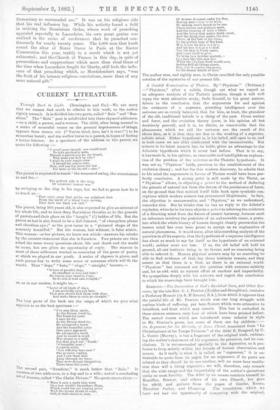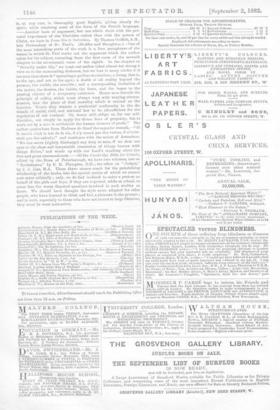SERMON8. — The Restoration of God's Banished Ones, and Other Ser- mons,
by the late Rev, G. J. Proctor (Hodder and Steughten), contains a Prefatory Memoir (by A. M'Kennal, B.A.), from which it appears that the painful life of Mr. Proctor, which was one Icing struggle with various kinds of suffering, yet bore flowers which were attractive to beholders, and fruit which may remain. This last is embodied in these sixteen sermons, only four of which have been printed before. The sacred verses which are introduced seem inferior in style to Mr. Proctor's prose, but some of them are for children.— An Argument for the Divinity of Jesus Christ, translated from "Le Christianisnie et lea Temps Pthents " of the Abb6 E. Bougaud, by C. L. Carrie (Murray), is but a fragment of the original work, embrac- ing the author's statement of his argument, its premises, and its con- clusions. It is recommended specially to the Agnostics, as it pro- fesses to keep strictly within the bounds of human observation and reason. As it really is what it is called, an " argument," it is un- desirable to quote from its pages, for an argument, if its parts are related as they should be to one another, will no more bear mutila- tion than will a living organism ; we will, therefore, only remark that the wide range and the impartiality of the author's quotations strike us most forcibly. The Abb6 by no means restricts himself to Massillon, Bossuet, nurl others of his own Church, but goes far afield, and gathers from the pages of Goethe, Renan,
Theodore Parker, and Chaining. The translation, which we have net had the opportunity of comparing with the original,
is, at any rate, in thoroughly good English, Oving clearly tho spirit, while retaining none of the form of the French language. —Another book of argument, but one which deals with the per- sonal experience. of the Christian rather than with the person of Christ, we have in From Sin to Salvation. By Thomas Griffith, A.M., late Prebendary of St, Paul's. (Hodder and Stoughten.)—One of the most interesting parts of the work is a free paraphrase of the verses in which St. Paul works out the argument which the author takes for his subjoct, extending from the first verso of the seventh chapter to the seventeenth verse of the eighth. In the chapter on " Security under Sin," we bast our author takes almost too strong a view as to the surrounding darkness, but we fear in many circles it is too true that there is "spreading a godless secularism; a living, that is, to the age, and not to the ages ; a doubt of all reality beyond the present, the visible, the sensible ; and a corresponding limitation of the tastes, the desires, the habits, the fears, and the hopes to the passing objects of a temporary existence. Hence mon intrude the principle of utility, which Must always vary with varying circum. stances, into the place of that morality which is eternal as the heavens. Hence they assume a prudential. conformity to the de- mands of social, civil, and national law 'to bo all-sufficient for the regulation of Our conduct. Or, worse still, oblige ns, for our self- direction, not simply to apply the divine laws of propriety, but to work out by a sum in arithmetic the human chances of profit." The author quotes here from Madame do Steel the apposite romark,—" Si lo succes &sit le but de la vie, it L'y aurail, pas des vertus, it n'exist- erait quo des macula;" and continues with tho axiom of Antoninus, " We can never (rightly discharge) any duty to man, if wo shut our eyes to the close and inseparable connection of things human with things divine," and winds up with our Lord's teaching about the first and great commandment.—Of tho Cambridge Bible for Schools, edited by the Dean of Peterborough, we have two volumes, one on " Ecclesiastes," by E. H. Plumptre, D.D.; the other on " Judges," by J. J. Liss, ALA. These three names vouch for the painstaking scholarship of the books, into the special merits of which we cannot now enter critically ; only, wo do feel inclined to enter a protest on behalf of the girls and boys, if they are expected, while at school, to enter into the many disputed questions involved in such studies as these. We should have thought the style more adapted for older people, who have learned to think and feel a pleasure in the process ; and to such, especially to those who have not access to large libraries, they must be most instructive.































 Previous page
Previous page